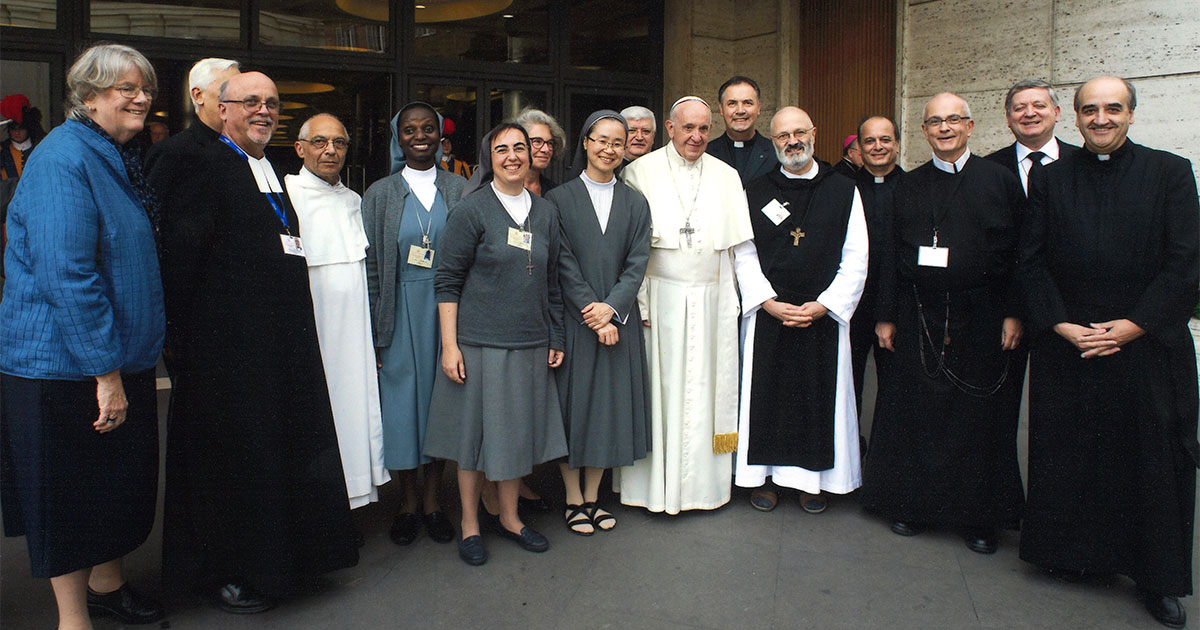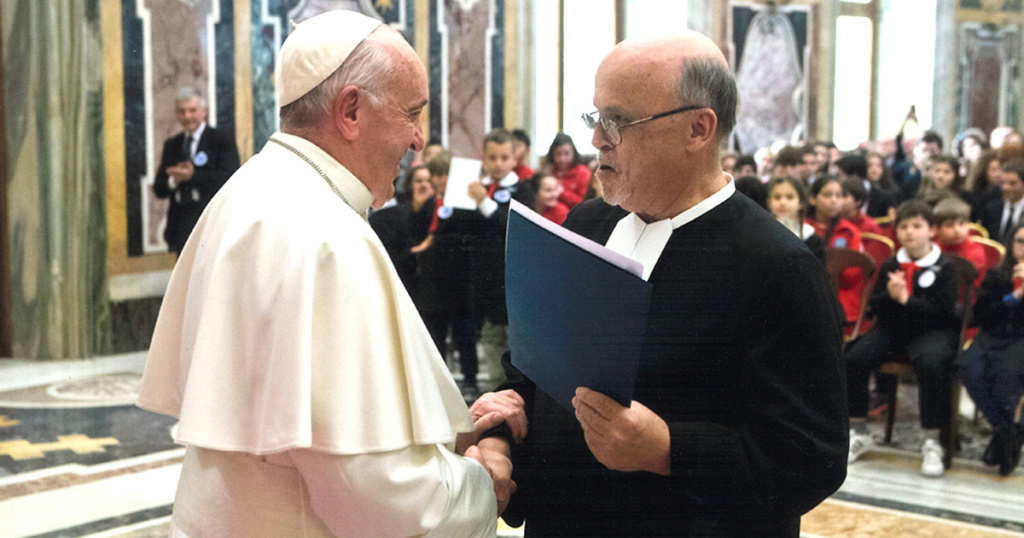La Salle University
Brother Robert “Bob” Schieler, FSC, Ed.D., ’72, served as superior general of the Brothers of the Christian Schools from May 2014 through May 2022 and interacted with Pope Francis on numerous occasions.

Brother Robert “Bob” Schieler, FSC, Ed.D., ’72 (second from left) joins Pope Francis with the superiors of the different religious congregations, such as the Jesuits, Dominicans, Franciscans, and Redemptorists in October 2018 during the Synod on Youth.
Brother Robert “Bob” Schieler, FSC, Ed.D., ’72, served as superior general of the Brothers of the Christian Schools from May 2014 through May 2022. During that time, he had many opportunities to interact with Pope Francis. The first was on the occasion of his election in 2014 as superior. Pope Francis invited him and the former Superior Brother Alvaro Rodriguez, FSC, to his daily morning Mass. At the conclusion of that Mass, Brother Bob invited the Pope to come to the Brothers’ headquarters in Rome in 2019 to celebrate the 300th anniversary of Saint John Baptist de La Salle’s entry into eternal life. The Pope responded, “Oh, there’ll be another Pope by that time!” Thankfully, that was not to be the case.
Legacy and Leadership Style
Among Pope Francis’ legacies are a new direction for a synodal Church, listening from the peripheries to the center; his emphasis on the poor as our educators and evangelizers; his emphasis on honoring God’s creation and our responsibility for protecting the environment for future generations; and his appointing cardinals from second and third line cities around the world.
The reality of the poor and their needs permeate much his writings. Pope Francis urges us to keep the poor in front of us because they’re our best teachers.
As a leader, he tried to be a pope for all humanity, not just the Catholic Church. A pillar of his leadership style was the conviction that change usually comes from the bottom up, and not from the top down. It also emanatesfrom a variety of sources. He made that evident with his encounters and dialogues with the Muslim community, the Jewish community, the people of different faith communities throughout Asia. He went out of his way to encounter them, to listen to them, and to learn from them. This too is an important piece of his legacy.

Humility and Approachability
Pope Francis was very human, very approachable. He was interested in every person he met, giving them his full attention. This is a rare gift and not always evident in people we meet, especially among our leaders. They shake our hand, but their eyes are elsewhere.
Pope Francis would want us to be a welcoming people, especially to those who are struggling in one way or another. He was serious when he frequently reminded us that we are all sisters and brothers sharing a common home, planet Earth. He meant that from the heart, that we treat each other as sisters and brothers. The plight of migrants was especially uppermost in his mind. I am reminded of the frequent phrase from the Old Testament, that we are all called to care for the widow, the orphan, the stranger (the foreigner) in our midst. What a different world it would be if we heeded this admonition!
Symbolic Acts and Public Witness
He will be remembered for his ability to break with rituals and customs of the past. He was not afraid to break out of the norms for papal behavior. For example, he choosing not to live in the papal apartments, and to be chauffeured in a small Fiat. Traditionally, on Holy Thursday, the Pope washed the feet of 12 men, symbolic of Jesus washing the feet of the 12 Apostles. Pope Francis washed the feet of women and men, prisoners and the homeless, Muslims and Jews. Like his namesake, Saint Francis of Assisi, he lived that great Saint’s words: “preach the Gospel, use words if necessary.”
Moments of Dialogue and Synod Participation
The 2018 Synod on Youth is a particular moment in my interactions with him worth recalling. Traditionally, when it came to voting on matters arising during a synod or voting on its conclusions and final document, only the ordained – priests, bishops, and cardinals – were allowed to vote. But on that occasion, myself and the Brother Superior of the Marist Brothers were granted the right to vote. During a coffee break, we both thanked the Pope for granting us the privilege and asked him, “Why not the Sisters? Why aren’t they given the same privilege?” He said, “I had enough trouble getting agreement from my fellow bishops to allow you two to vote!” Then he said, “One step at a time, I’m working on it.” And sure enough, subsequently not only sisters and brothers, but lay people, had the chance to vote at the most recent Synod on Synodality. The Pope was a man of his words.
The superior generals residing in Rome meet in assembly twice a year. Occasionally, Pope Francis joined us for conversation. He didn’t come with an agenda. He invited questions. On one occasion a superior asked him about his health. Pope Francis shared with us that when he stood on the balcony the night he was elected pope, he said a great peace came over him. That peace, he said, never left him. Now this was five or six years into his papacy, but that peace that came over him as he was standing on the balcony, looking at the crowd below in St. Peter’s Square, never left him, despite all the challenges, despite all the problems, despite all the responsibilities, that peace that gift of the Spirit remained with him always. I thought that was a wonderful statement. And a place to conclude this reflection. Thank You!
Br. Bob recently published A Charism Ever New, chronicling his experiences over a transformative three-decade journey.